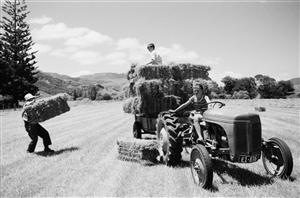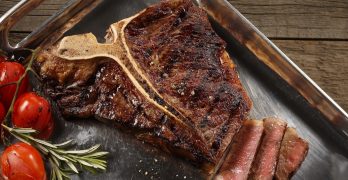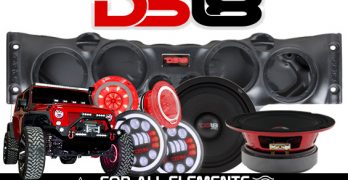 Coming from a (semi)farming background I sometimes find using farming metaphors and analogizes to explain situations in business come to me rather easy. In this case, explaining why it is good to keep your online social community free of individuals who do not understand how social communities work, care for anyone except themselves or are out to benefit only for themselves, was like my grandfather explaining to me why you don’t want weeds in your hay.
Coming from a (semi)farming background I sometimes find using farming metaphors and analogizes to explain situations in business come to me rather easy. In this case, explaining why it is good to keep your online social community free of individuals who do not understand how social communities work, care for anyone except themselves or are out to benefit only for themselves, was like my grandfather explaining to me why you don’t want weeds in your hay.
As was the case in so many of my grandfathers explanations on ‘Why’ we did things, his short gruff statement were filled with immense prophesy. Here is a rather long but good story about why we had to keep bad weeds out of the hay.
Learning Curve
I remember vividly the years of my early teens of having to get up at 4:30AM the first of September to partake in the annual ‘hay bale’.
At the time, I hated every minute of it, but now look back frequently realizing what I was actually doing was experiencing Real Life and the problems associated with it.
I remember standing in the headlights of my grandfathers 1948 Ford pickup on an old dusty road that ran aside the 400 acre hay meadow he farmed. The weight of my fresh starched long-sleeved denim shirt buttoned up to my neck, leather gloves, my Wrangler jeans and my heavy work boots hanging on my yet unawake body was something I will never forget. Oh, I had been there before so the attire I was wearing was not really the issue as much as it was the job I was about to be part of for almost the entire day. It was going to be hard and hot work,
Since this morning was a moonless morning the only thing you could see was whatever was in the lights of the trucks and tractors that all pulled up for work we had to do. The chatter amongst my family clan was brisk and the chuckles about what the women of the family were going to fix for lunch was the traditional conversation before my grandfather put his foot down with his annual statement..’ain’t going be no eat-n until we get this hay in the barn’. Then he would pick out a grandson out of the bunch of us to go with him off across the meadow to check the rows of grass that was cut two days before. This particular year it was my turn to make that ride.
Lessons for a Lifetime
Riding across a rugged field in a 1948 Ford pickup was like putting a golf ball in a can and hitting it with a nine iron..and I was like that golf ball bouncing around inside the can. During all the next five minutes of riding down the rows of cut grass I got the usual questions..’how’s school?..they teaching ya anything?..rhetorical questions..which you never ever tried to get into a conversation about because every time you open your mouth he would stop the truck jump out the door with..’come-on..lets take a look.’
By the time I got out of the truck and ran around to where my grand-da was he had already kicked open a stack of grass and had a handful of fresh cut hay in his face smelling it. Little did I know then that this was where the lessons he was going to teach me for the day started.
He started off telling me..’we have to check to make sure the humidity in the rows is not too high are it will mold in the bales’. As we got back into the pick-up and slammed the door he said..’I hope we don’t get too many weeds in this cut’!’. Of course that struck me odd because all I could see laying on the ground looked to me to be nothing but weeds.
Naturally, I asked…’Isn’t hay mostly all weeds?’ This got my grandpa to chuckle and is when he began his lecture on the good and bad weeds of hay that included a healthy explanation on the basic economics of the hay business which really explains the economics of how any business should feel about the quality of the products they produce. What he had to say also relates to how things are going today in business and something social networks and niche online communities should consider when building or gathering the people to be part of the community.
Windshield Classroom
I always enjoyed how my grandfather pointed to examples through the windshield of the truck that illustrated the point he was about to make. This time the point from his leathered gloved hand came an instant after we come to a screeching stop and he jumped out of the truck to say..’See, this Sunflower? Ya don’t want any sunflowers in your hay. The buyer will be bringing that ‘haul’ right back wanting his money back. Then when the word gets out that you’re putting sunflowers in the hay. You’ll be going out of business pretty quick’. When I asked why are sunflowers bad I got the long answer that lead up to use getting back to the rest of the family right as the sun was coming up.
“Son, sunflowers are like the guy that stands up at a ballgame to curse out the umpire or player without any regard for anyone around him. Or is like the guy who makes sure he stands out in a crowd by wearing bright colored cloths and talks REAL loud so people will notice him but has absolutely nothing to offer. All sunflowers are out for is to take whatever food is in the ground of the hay meadow for itself and could careless about the grass in the meadow. All a sunflower wants is attention. Now, sunflowers do have a purpose and sunflower seeds are important, but they only flourish when they are planted in a field all to themselves. A sunflower does not belong in a hay meadow. It is hell to keep them out, but if you don’t get rid of them before you bale the hay they will cost you your business. Sunflowers also weight a lot and cause the bale of hay to weight more than it should. The buyer is buying the hay by the weight of the bale. A sunflower will falsely make the bale of hay feel heavier than it should. IT is wrong to deceive your customer..it will come back to you in spades. Sunflowers also will tear up the the baler and will rot in the bale in just a few days causing the entire bale of hay to be worthless. You want to keep sunflowers out of your hay business and keep them in their own field with other sunflowers..where they starve themselves to death.”
During that ride and explanation of why you don’t want bad weeds in your hay resounded with me and a number of business endeavors I am in today. My grandfather’s analogies then reason with why you don’t want undesirable individuals in your social networks. Especially niche communities. My grandpa explained it very well..‘The customer is coming to me to buy ‘clean hay’..if the hay has too many bad weeds in it he is not getting what he paid for and that does not make for a good business relationship.’
He went on to say..
”also, some of the bad weeds will make the rest of the hay turn sour or uneatable by the livestock it is being fed to. A bad field of hay could cause cattle and horses to get real sick and then you have a huge problem that you will not out live. Its best to get the weeds out as soon as they are spotted. It takes a lot of hard work to produce clean hay, but clean hay brings a good price on the market.”
How many sunflowers do you notice in the business networking groups you attend? If you belong to an online social network, how many sunflowers do you see in their membership and does the owner or leader of that site really care they got sunflowers in their hay?
Next time I will be back to tell you the story why you don’t want poison ivy in your hay either. Let me know how I can help.











